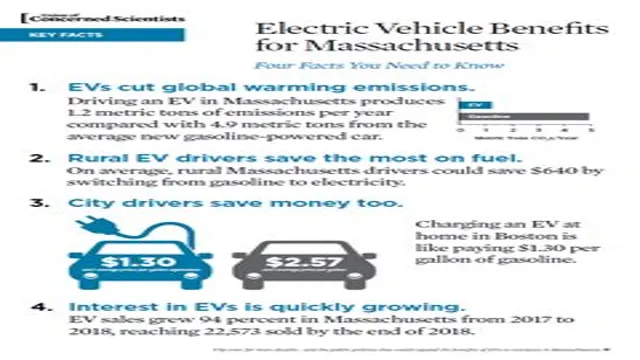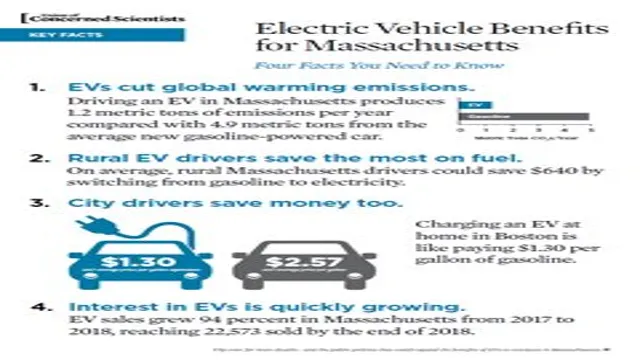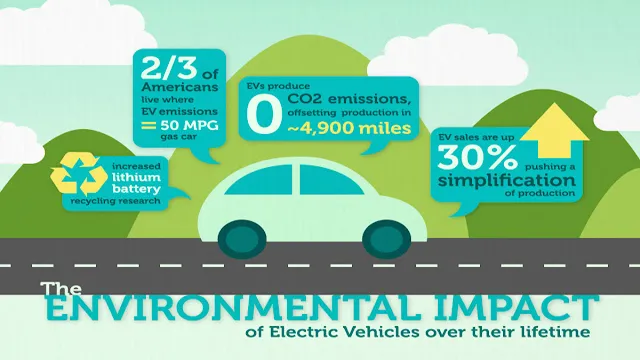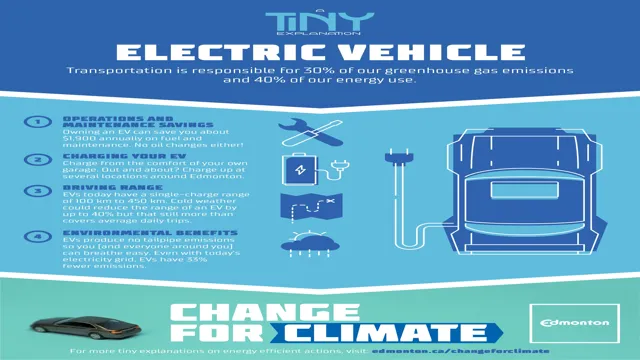Powering the Future: Unveiling the Sustainable and Economic Benefits of Electric Cars
Have you considered switching to an electric car? With climate change becoming an increasingly pressing issue, electric cars have emerged as a great alternative to conventional cars powered by fossil fuels. From environmental benefits to cost savings, there are several reasons to make the switch. In this blog post, we will dive into the benefits of electric cars and why they may be the right choice for you.
So, fasten your seat belts and get ready to explore the world of electric cars!
Cost Savings
When it comes to electric vehicles, one of the biggest benefits is the cost savings. While electric cars are often more expensive to purchase initially, they can save you significant amounts of money in the long run. For starters, they don’t require gasoline, which can save you thousands of dollars over time.
Additionally, electric vehicles require less maintenance and have fewer moving parts, which means fewer repairs and maintenance costs down the road. When you factor in tax incentives and rebates, electric vehicles become an even more attractive option. In the end, the costs savings of an electric vehicle can make it a more economical choice over the years, in addition to their environmental benefits.
So next time you’re thinking about purchasing a car, consider an electric vehicle for its long-term cost savings and eco-friendly attributes.
Lower Fuel Costs
Lower fuel costs can provide significant cost savings for businesses. Fuel is often one of the most expensive operational costs for transportation-based industries. Fortunately, advances in fuel-efficient technology have enabled businesses to reduce their fuel consumption and save money.
Hybrid and electric vehicles are excellent examples of this technology and are becoming increasingly popular in the market. Some businesses have also implemented more sustainable fuel sources, such as biofuels or natural gas, to reduce their carbon footprint and lower their fuel costs. Additionally, effective route planning and maintenance practices can also help businesses reduce fuel consumption and save money.
By implementing these cost-saving measures, businesses can significantly decrease their overhead while remaining competitive in their respective industries.

Government Incentives
Government incentives can greatly help businesses cut down on costs. These incentives can range from tax credits and grants to accelerated depreciation schedules. For instance, some governments offer tax credits for businesses that invest in renewable energy initiatives, such as solar panels or wind turbines.
Besides, governments may also offer grants for small businesses to invest in new equipment or technology that promotes energy efficiency, reducing their operating costs effectively. Additionally, accelerated depreciation schedules allow businesses to deduct a bigger portion of the cost of new equipment in the early years of its use, leading to significant tax savings. All these cost-savings measures provided by governments encourage businesses to be more sustainable and profitable while also helping to protect the environment.
By taking advantage of these incentives, companies can reduce their overall operating costs, improve their bottom lines, and create a more sustainable future.
Environmental Benefits
Electric cars have numerous environmental benefits that make them an attractive option for drivers looking to reduce their impact on the planet. One of the most significant benefits is their reduced carbon emissions. Electric cars don’t burn gasoline like traditional cars, which means they don’t produce as many greenhouse gases.
This reduction in emissions helps to improve air quality and reduce the negative impacts associated with climate change. Another environmental benefit of electric cars is their potential to reduce noise pollution. Because they don’t have an internal combustion engine, they’re much quieter than traditional cars.
This can have a positive effect on quality of life for people living in busy urban areas. The benefits of electric cars also extend to the reduced need for natural resources like oil, which can help to protect sensitive ecosystems. All of these benefits make electric cars a compelling choice for anyone looking to reduce their environmental impact while still enjoying the freedom and convenience that comes with owning a car.
Reduced Emissions
Reduced emissions isn’t just good for businesses, it has far-reaching environmental benefits too. By decreasing the amount of greenhouse gases released into the atmosphere, we’re able to reduce the impact that human activities have on our planet. One of the most significant ways this can happen is through the reduction of carbon dioxide emissions from the burning of fossil fuels.
By using more sustainable energy sources or improving the efficiency of energy use in buildings and transportation systems, we can drastically reduce our carbon footprint. This has the added benefit of contributing to sustainable development, which can help to protect ecosystems and biodiversity for future generations. By getting serious about reducing our emissions, we can help to limit the negative impacts of climate change and ensure a brighter future for ourselves and the planet.
Lower Carbon Footprint
Lowering your carbon footprint is an incredibly important act to help reduce the adverse effects of climate change. By making small changes in your daily life, you can make a significant difference to the environment. One of the key benefits of reducing your carbon footprint is preserving the planet’s natural habitats and wildlife.
When we emit fewer pollutants into the atmosphere, we help create a cleaner environment for flora and fauna that depend on it. In addition, reducing our carbon footprint can help to enhance the air quality, which can directly influence our physical health. As we drive less and use more eco-friendly transportation options, we help create clean air for ourselves and for the people around us.
By taking responsibility for our actions, we can all work together to protect the environment for generations to come. So why not reduce your carbon footprint today by making simple changes such as walking or cycling instead of driving, turning off electrical appliances when not in use, recycling, and using renewable energy sources! These small daily actions will all add up to make a big difference in the fight against climate change.
Reduced Noise Pollution
Reduced Noise Pollution One significant environmental benefit of reducing noise pollution is the improvement of overall health and well-being. Excess noise can cause a range of health problems, including sleep disturbance, hypertension, and even heart disease. From busy city streets to loud industrial equipment, noise pollution can be a constant and insidious problem.
But by reducing the amount of noise in our environments, we can not only create a more peaceful setting but also protect our health and that of others around us. With quieter environments comes less stress and anxiety, as well as better communication and increased productivity. By making a conscious effort to reduce noise pollution, we can create a safer and more enjoyable living environment for ourselves and future generations.
Convenience and Efficiency
The benefits of electric cars are plentiful, but one of the major advantages is definitely convenience and efficiency. Firstly, electric cars are incredibly easy to maintain. There’s no need to change oil or perform other regular maintenance tasks that you’d have to do with a gas-powered car.
Plus, they tend to have fewer moving parts, so there’s less that can break down or require repair. Secondly, electric cars are extremely efficient. They can travel long distances on a single charge, and there are more and more charging stations being installed across the country, so you don’t have to worry about running out of power.
They’re also very quiet and smooth to drive, making for a very comfortable driving experience. All in all, the convenience and efficiency of electric cars make them a great choice for anyone looking for a reliable and practical vehicle.
Ease of Charging
When it comes to electric cars, one major concern for potential buyers is the ease of charging. Fortunately, with the advancements in technology and infrastructure, charging an electric car has become much more convenient and efficient. Nowadays, there are various charging options available for electric vehicles, including home charging, public charging stations, and fast charging stations.
Home charging is the most convenient option as it allows you to charge your car overnight while you sleep, and wake up to a fully charged vehicle. Public charging stations are widely available at shopping centers, restaurants, and other public locations. Fast charging stations, on the other hand, are designed to quickly charge your electric car in a matter of minutes, making them ideal for long road trips.
With the increasing number of charging stations being added every day and the technological improvements in batteries, electric cars are becoming more practical than ever before.
Less Maintenance Needed
One of the biggest advantages of automation is the convenience it brings to our lives. When it comes to home and commercial spaces, automation systems significantly reduce the amount of maintenance required. For instance, an automated HVAC system can easily regulate the temperature and check the air quality, ensuring a comfortable environment without the need for constant monitoring.
Similarly, automated lighting and security systems can operate on pre-set schedules, eliminating the need for manual switching and reducing energy consumption. Additionally, many automation systems can be managed remotely, allowing homeowners and business owners to stay connected to their properties from anywhere. All of these conveniences make automation an attractive option for those looking to simplify their lives while increasing the efficiency of their properties.
Improved Driving Experience
Electric cars have numerous benefits, and one of the most significant is an enhanced driving experience. Electric cars are known for their smooth and quiet rides due to their lack of an internal combustion engine. This lack of engine noise also means that the usual vibrations and harshness associated with gas-powered cars are eliminated.
Additionally, electric cars typically have quicker acceleration due to their instant torque, providing a more responsive drive. There is also a reduced need for gear shifting, as electric cars often have single-speed transmissions or no transmission at all. Plus, with the added benefits of regenerative braking, electric cars offer a more engaging and interactive driving experience overall.
Overall, electric cars provide a comfortable, smooth, and responsive driving experience, making them a popular choice for drivers looking for an innovative and eco-friendly mode of transportation.
Conclusion
In conclusion, electric cars are not only environmentally friendly but also financially savvy. They have revolutionized the transportation industry by providing a cleaner and more efficient way of getting around. Plus, with the added benefits of quiet engines and smooth driving, electric cars are sure to amaze and delight even the most skeptical drivers.
So why stick with the old gas-guzzling models when you can feel good and look good in an electric car?”
FAQs
What are the main advantages of driving an electric car?
There are numerous benefits to driving an electric car including lower fuel and maintenance costs, reduced greenhouse gas emissions, and a quieter ride.
How long do electric car batteries typically last?
The lifespan of an electric car battery can vary, but typically they last around 8-10 years depending on usage and maintenance.
Can electric cars be charged at home?
Yes, most electric cars can be charged at home using a standard electrical outlet or with a level 2 charging station for faster charging times.
What is the range of most electric cars?
The range of electric cars varies, but most can travel between 100-300 miles on a single charge depending on the model and driving conditions.
Are electric cars more expensive to buy than gas cars?
Electric cars can have a higher upfront cost, but they often come with incentives and tax credits that can make them more affordable. Additionally, electric cars have lower operating costs than gas cars over time.







